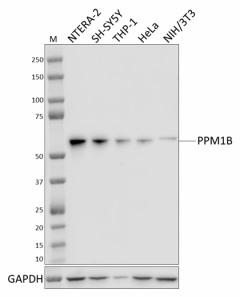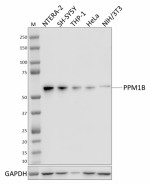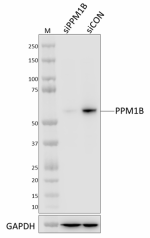- Clone
- W19264A (See other available formats)
- Regulatory Status
- RUO
- Other Names
- Protein Phosphatase 1B, PP2CB, PP2C-beta, PP2C-beta-X, Protein Phosphatase, Mg2+/Mn2+ Dependent 1B, Ser/Thr Protein Phosphatase Type 2C Beta 2 Isoform
- Isotype
- Rat IgG2b, κ
- Ave. Rating
- Submit a Review
- Product Citations
- publications

-

Whole cell extracts (15 µg total protein) from the indicated cells were resolved by 4-12% Bis-Tris gel electrophoresis, transferred to a PVDF membrane, and probed with 1.0 μg/mL (1:500 dilution) purified anti-PPM1B antibody (clone W19264A) overnight at 4°C. Proteins were visualized by chemiluminescence detection using HRP goat anti-rat IgG antibody (Cat. No. 405405) at a 1:3000 dilution. Direct-Blot™ HRP anti-GAPDH antibody (Cat. No. 607904) was used as a loading control at a 1:25000 dilution (lower). Lane M: Molecular weight marker. -

Whole cell extracts (15 µg total protein) from HeLa cells treated with non-targeting control siRNA (siCON) or siRNA targeting PPM1B (siPPM1B) were resolved by 4-12% Bis-Tris gel electrophoresis, transferred to a PVDF membrane, and probed with 1.0 μg/mL (1:500 dilution) purified anti-PPM1B antibody (clone W19264A) overnight at 4°C. Proteins were visualized by chemiluminescence detection using HRP goat anti-rat IgG antibody (Cat. No. 405405) at a 1:3000. Direct-Blot™ HRP anti-GAPDH antibody (Cat. No. 607904) was used as a loading control at a 1:25000 dilution (lower). Lane M: Molecular weight marker.
| Cat # | Size | Price | Quantity Check Availability | Save | ||
|---|---|---|---|---|---|---|
| 934201 | 25 µg | 118 CHF | ||||
| 934202 | 100 µg | 293 CHF | ||||
Protein phosphatase 1B (PPM1B) is a member of the Protein Phosphatase 2C (PP2C) family of monomeric metal-dependent Ser/Thr protein phosphatases which are dependent on Mg2+ and Mn2+ for their catalytic activity, and function in the negative regulation of cellular stress signaling pathways. PPM1B contributes to the regulation of both cell senescence and proliferation as a regulator of the p38 MAPK pathway and negatively regulates necroptosis through dephosphorylation of receptor-interacting protein 2 (RIP3), one of the primary mediators of necrotic programmed cell death. It is one of a limited number of proteins that can dephosphorylate nuclear receptor PPARγ, thereby stimulating its transcription and contributing to its role in cellular differentiation and metabolism. It is also associated with the dephosphorylation of p53, TAK1, and, in some cell types, the negative regulation of NF-κB signaling through dephosphorylation of nuclear factor kappa B kinase subunit β (IKKβ). PPM1B plays a role in the mediation of antiviral response by acting as a TBK1 phosphatase via dephosphorylation at Ser172 and suppresses cancer cell proliferation and tumor progression through the dephosphorylation of Rho guanine nucleotide dissociation inhibitor 1 (RhoGDI1), a key regulator of Rho GTPases.
Product DetailsProduct Details
- Verified Reactivity
- Human, Mouse
- Antibody Type
- Monoclonal
- Host Species
- Rat
- Immunogen
- Partial recombinant human PPM1B protein
- Formulation
- Phosphate-buffered solution, pH 7.2, containing 0.09% sodium azide
- Preparation
- The antibody was purified by affinity chromatography.
- Concentration
- 0.5 mg/mL
- Storage & Handling
- The antibody solution should be stored undiluted between 2°C and 8°C.
- Application
-
WB - Quality testedKO/KD-WB - Verified
- Recommended Usage
-
Each lot of this antibody is quality control tested by western blotting. For western blotting, the suggested use of this reagent is 0.125 - 1.0 µg/mL. It is recommended that the reagent be titrated for optimal performance for each application.
- Application Notes
-
This clone failed to stain PPM1B in HeLa cells fixed with 4% PFA and permeabilized with either Triton X-100 or methanol. It also failed to stain cells fixed and permeabilized with methanol.
- Additional Product Notes
-
This clone failed to stain PPM1B in HeLa cells fixed with 4% PFA and permeabilized with either Triton X-100 or methanol. It also failed to stain cells fixed and permeabilized with methanol.
- RRID
-
AB_2894521 (BioLegend Cat. No. 934201)
AB_2894521 (BioLegend Cat. No. 934202)
Antigen Details
- Structure
- PPM1B is 479 amino acid protein with a predicted molecular weight of 52 kD.
- Distribution
-
Ubiquitously expressed/ cytosol and membrane
- Function
- Protein phosphatase
- Biology Area
- Cell Biology
- Molecular Family
- Protein Kinases/Phosphatase
- Antigen References
-
- Cho H, et al. 2018. Cancer Letters. 417:141
- Park J, et al. 2014. Mech Ageing Dev. 138:45.
- Tasdelen I, et al. 2013. Biochem J. 451:45.
- Wanz C, et al2015. Nat Cell Biol. 17:434.
- Zhao Y, et al. 2012. Cell Signal. 24:2197.
- Gene ID
- 5495 View all products for this Gene ID
- UniProt
- View information about PPM1B on UniProt.org
Related FAQs
Other Formats
View All PPM1B Reagents Request Custom Conjugation| Description | Clone | Applications |
|---|---|---|
| Purified anti-PPM1B | W19264A | WB,KO/KD-WB |
Compare Data Across All Formats
This data display is provided for general comparisons between formats.
Your actual data may vary due to variations in samples, target cells, instruments and their settings, staining conditions, and other factors.
If you need assistance with selecting the best format contact our expert technical support team.
 Login / Register
Login / Register 









Follow Us